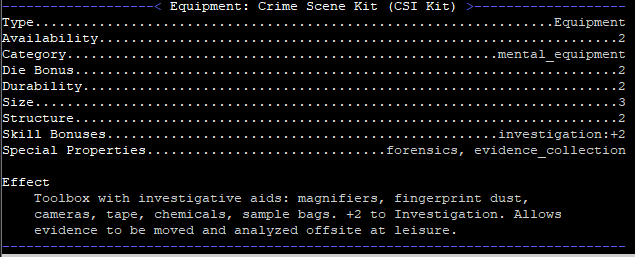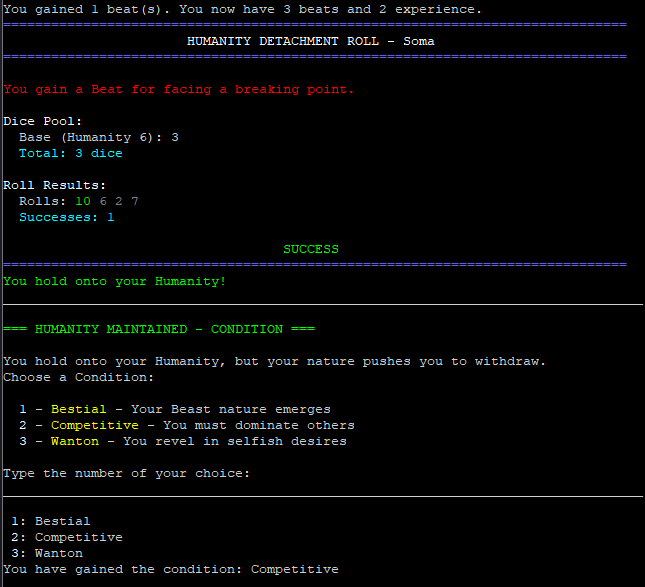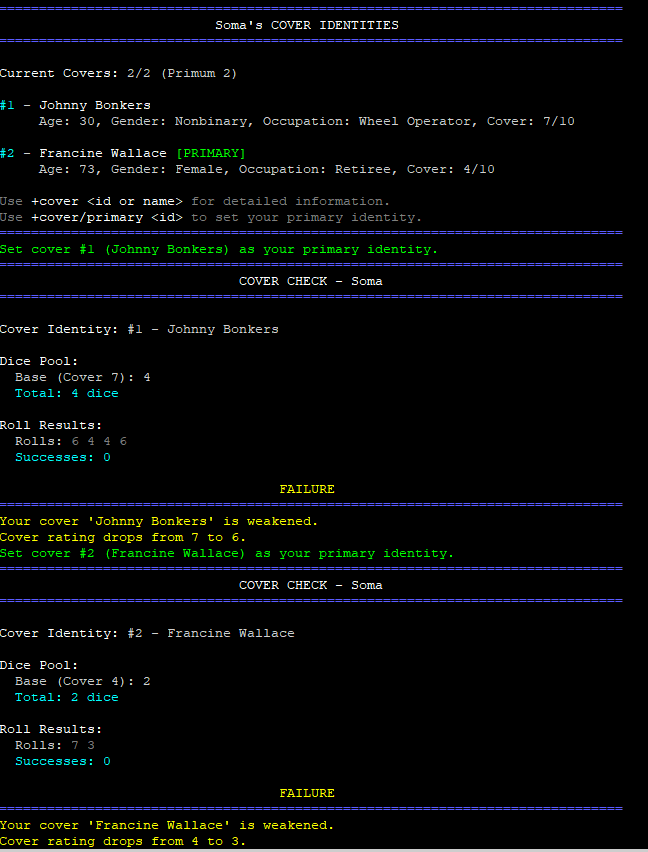I’m still plugging away here! I think I’m close to a good release candidate, with the exception of the web-facing side. The main things I’ve been working on lately have been in display consistency, since the primary mechanics-based stuff has been done for a bit.
Some general wishlist items I’m continuing to work on:
- making equipment a little less complex for the admin; right now the only way to modify the equipment is to modify it directly in the equipment_database.py file. It’s not exactly complicated to do so (see below), but I’m really going for the experience of not having to touch any of the code itself after it gets initialized. I also have a second piece for equipment which can only be managed through the equipment_purchasing.py file (also see below).
- the mysteries system, which is usable but I feel is missing something. The point of it is to create options for people to be involved in plots when they can’t otherwise be. For instance, Australian or European players who are working with a storyteller who lives on the US West Coast and rarely gets a chance to run scenes when the Euro and Aussie players are around.
- Automated combat because, man, those WoD combat scenes
- I haven’t put a ton of focus on the legacy templates outside of my initial implementation of them, so I need to finish those up in case people want to run nwod 1st edition games.
Melee weapon example
"chainsaw": WeaponData("Chainsaw", damage=3, initiative_mod=-6, weapon_type="melee",
size=3, strength_req=4, availability=3, tags="bleed, inaccurate, two-handed")
Ranged weapon example:
"rifle": WeaponData("Rifle", damage=4, initiative_mod=-5, weapon_type="ranged",
size=3, strength_req=2, availability=2, capacity="low"),
Armor example:
"flak_jacket": ArmorData("Flak Jacket", general_armor=2, ballistic_armor=4,
strength_req=1, defense_penalty=-1, speed_penalty=0, availability=2,
coverage=["torso", "arms"]),
General equipment example:
"crime_scene_kit": EquipmentData(name="Crime Scene Kit", category="mental_equipment",
die_bonus=2, durability=2, size=3, structure=2, availability=2,
effect="Toolbox with investigative aids: magnifiers, fingerprint dust, cameras,
tape, chemicals, sample bags. +2 to Investigation. Allows evidence to be moved
and analyzed offsite at leisure.", skill_bonuses={"investigation": 2},
special_properties={"forensics": True, "evidence_collection": True}),
The special properties and coverage don’t really do anything at the moment, as that links back to the mysteries system and automated combat system. Here’s what this looks like on game:


And so on. The other configuration piece for equipment is similar to how XP is configured, using the admin commands. By default, it is a pool of resource points that you can spend on a monthly basis. This has been set up to be modifiable to address how frequently you want people to be able to buy things, whether you can save points on a time-by-time basis (default being that you add new points into your existing pool each month). I also inserted a couple supplemental merits that increase your resource pool, notably Status and Contacts. In Chronicles of Darkness, purchases are made via availability, so anything that adds to your ability to buy equipment is (in my mind) centered on your ability to source and acquire it, which includes who you know.
I think I mentioned this before, but XP can be configured in either a weekly auto release situation (default is 1 XP per week), or on a +vote system, both of which are easily configured with regards to how much XP you can acquire per week, or how much XP a +vote provides. The XP system is tied into the other functions of the game, such as roll (exceptional successes, dramatic failures), integrity rolls, and conditions and aspirations, which are all managed by the players.
I made the integrity roller a little prettier. This is using a Vampire character sheet with Humanity 6. I succeeded at my check, therefore I maintained my humanity, acquired a beat because I had a degeneration roll, and gained one of the conditions suggested in VtR.

In several cases including this as you can see, I use EVMenu to select conditions rather than rely on the player to do it manually via the +condition command. There is also an option to add a condition using the +condition command, which will also show you what conditions you have set on yourself when you use it.
Recently I’ve been playing around more with the Demon integrity stuff. Demons have the option to create additional covers when they hit a certain level of Primum (among other methods). It’s not as elegant as I would like, but right now you set your current primary cover and your integrity will be based off of that. Since Demons don’t gain a beat or condition if their Cover drops (correct me if I’m wrong), it just affects the rating based on the roll:

There’s probably a lot of other little things I’ve done in the past six five months that are generally escaping me at the moment and I also don’t to blow this up with a ton of screenshots more than I have. Anywho, still truckin’!
One last thing is that I took a lot of those generic sort of MUSH commands that people expect which were mentioned above and put them into their own commands folder called ‘commonmux’ with a cmdset. The intention is that you can just grab that cmdset and import it into your default_cmdsets file. This contains the following commands: alias, alts, emit/pose/say (with language mixin), +finger, ooc chat, tabletalk/places, shortdesc, +staff, +who, +watch, page, +weather, and +note. I’ve run through the process of getting around ten-ish different Evennia installations up and running while installing those and the only problems that arise are related to the tabletalk/places commands and the language mixins with pose/say/emit. Those two rely on the pyreach characters and rooms typeclasses. I put in some instructions on what exactly you need to remove to get them to work, though! Goal being that it makes Evennia emulate the MUSH experience a bit better so people feel more comfortable with it.




